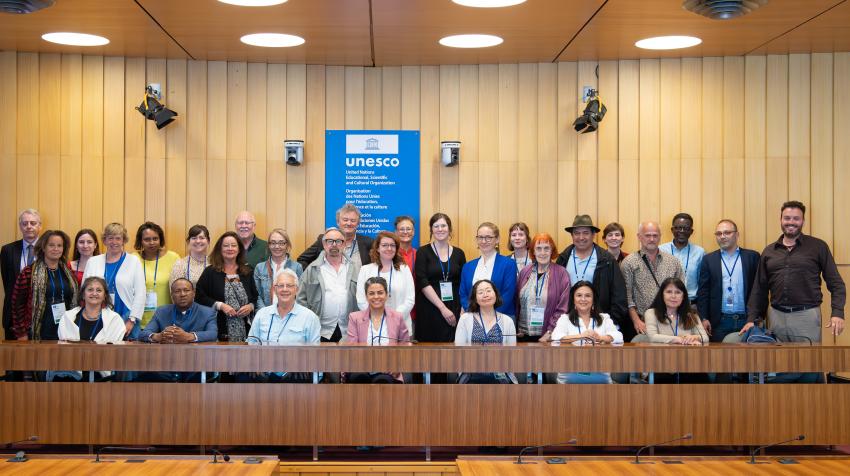December 2014, No. 3 Vol. LI, Conference Diplomacy
The Congress of Vienna—A Milestone on the Way to Conference Diplomacy
Conference diplomacy is not just one of the most powerful multilateral instruments to peacefully address questions related to post-conflict balance of power. It is today also the major tool in addressing global problems, identifying innovative solutions and engaging in groundbreaking strategies for the sake of millions of people. The Post-2015 United Nations Development Agenda is a case in point. It is therefore an interesting exercise to have been invited to take a fresh look at recent conference diplomacy in the light of the bicentenary of the 1814-1815 Congress of Vienna.
In fact, the Congress of Vienna lived up to its objective of creating a peaceful and stable order for generations. It took place in a highly fragile era of transition from the austere and rigid ancien régime to transparent modern mass society forged by democratization and inclusiveness. Even if the Congress failed to address the major achievements of the French Revolution and deep-rooted changes of the time, the catalytic consensus of Vienna has been rightly regarded as a balance-of-power system of the first order—a precursor to the system we have today.
Importantly, the Congress of Vienna was the first conference of ambassadors. Much of what represents conference diplomacy today was established at the Congress and has functioned well since then. The choice of different levels of negotiations, the ranking of representatives, consultations in the margins of the official meetings, the search for feedback and the often stalling response from respective headquarters concerning their special issues, the overall coordination of an interconnected complex agenda—all these seem to us to belong to the present-day repertoire of Brussels, Geneva or New York. We deem these tools of promoting decision-making and dispute settlement to be self-evident and part of everyday diplomatic life, in order to further progress in one or another matter of interest to the international community.
And, most importantly, the Congress of Vienna put conflict mediation, in a very broad sense, at the centre of diplomacy.
Representatives of all the European States were chaired by a statesman bound to the capricious claims of his crown, and yet of impressive neutrality and diplomatic ability when mediating between others. The Final Act, signed on 9 June 1815 a few days before the Battle of Waterloo, embarked countries on a series of international meetings that would come to be known as the “Concert of Europe.” Let me, in a few words, illustrate how Klemens Wenzel Lothar Prince Metternich performed his sometimes contested role as chief negotiator.
It was all about “legitimacy.” This had become the buzzword for just and lawful territorial claims, meaning, at that time, “restoration.” It was a match between the Four Great Powers—Austria, Great Britain, Prussia and Russia—who, for a last time, were able to preserve a stable environment in their domains. For the business of peace, security and development, the external engagement of the international community in crisis and conflict management, in peacebuilding and statebuilding, legitimate state structures remain the buzzword, albeit in a slightly different manner. Legitimate state structures today require inclusive constitutional processes for national visions and identity, and they foster mechanisms for accountability, viewing people as rights-holders. The leading Statebuilding Guideline of the Organisation for Economic Co-operation and Development emphasizes the state-citizen relationship as the core issue to be managed in post-conflict situations. The current global governance discourse is very much about legitimacy and the inclusion of new actors.
Austria has many times served as a “platform” for peace, democracy, human rights and mediation efforts. This is reflected in our status of neutrality after the Second World War, our geostrategic position between East and West, the presence of United Nations institutions in Vienna, and Austria’s approach to conflict transformation—perhaps, inspired by the heritage of the Congress of Vienna. And it is implemented in Austria’s engagement for peace in the Western Balkans, its sustained leadership in international humanitarian action and its traditional participation in multilateral peace missions. Courageous pioneering by Austrian diplomats, peace mediators and scientists has added to official efforts.
Conference diplomacy as a form of working for peace has expanded over time and added other areas of focus. For instance, Vienna spearheaded the interreligious dialogue among high-level representatives of different churches and beliefs. Visionary normative regimes were kicked off. I would like to mention three outstanding developments:
Energy Security
In 1957, the International Atomic Energy Agency (IAEA) set up its headquarters in Vienna. Since then, it has held international conferences on a regular basis. Vienna has also become an international energy hub as the seat of another nine international organizations dealing with energy-related issues, from OPEC to REEEP to UNIDO (Organization of the Petroleum Exporting Countries; Renewable Energy and Energy Efficiency Partnership; and the United Nations Industrial Development Organization, respectively). Vienna Energy Club has recently adopted Sustainable Energy for All (SE4All), whose Global Facilitation Team located to Vienna in 2013.
Energy for sustainable development has been high on the agenda in Vienna for some 15 years. It all started with outreach efforts to garner international support for the World Energy Assessment, co-authored by the United Nations, the United Nations Development Programme and the World Energy Council in 2000. Austria’s then Secretary of State Benita Ferrero-Waldner had launched the Global Forum on Sustainable Energy (GFSE) in 1999. Through its global and regional meetings, GFSE became a unique multi-stakeholder platform with the strong involvement of developing countries. Its discussions on how to make energy for sustainable development a reality contributed to better cooperation on energy issues and helped usher in SE4All.
Since 2009, the biannual Vienna Energy Forum, held at the Vienna Hofburg and co-hosted by Austria, UNIDO and the International Institute for Applied Systems Analysis (IIASA), has facilitated the adoption of global goals on energy and built coalitions to reach them. The last forum, “One Year After Rio+20: The Energy Future We Want”, drew more than a thousand participants, including the Secretary-General of the United Nations, Heads of State, ministers, energy experts, representatives of international and non-governmental organizations, academia, civil society and the private sector. The upcoming Vienna Energy Forum, to be held from 18 to 20 June 2015, will provide crucial input on how to best include energy in the post-2015 sustainable development agenda.
Landlocked Developing Countries
The Second United Nations Conference on Landlocked Developing Countries (LLDCs) was just held in Vienna from 3 to 5 November 2014. This Conference drew the attention of the international community to the persistent challenges faced by the world’s 32 LLDCs, resulting from their lack of direct access to world markets. Their remoteness, additional border crossings and transit procedures, inefficient logistics systems and poor infrastructure make LLDCs incur substantially higher transport or other trade transactions costs when compared to coastal countries. Already in 2003, the adoption of the Almaty Programme of Action formed the first global partnership framework to address the special needs and challenges faced by LLDCs in achieving their development goals.
The outcome document—appropriately, the “Vienna Programme of Action”—includes policy priorities, targets and specific actions to be taken by LLDCs and transit countries to foster inclusive economic growth. More concretely, the Conference focused on the implementation of transit corridors and how to improve traffic and transit links of LLDCs to major hubs such as international ports. This can be achieved not only by developing transportation routes via road, air, sea and rail, but also by reducing bureaucratic hurdles for transit.
The Vienna Programme of Action also aims to enhance partnerships between the private and public sectors and, by this, make an important contribution to achieving the Post-2015 Development Agenda.
Humanitarian Impact of Nuclear Weapons
Another recent contribution to international dialogue for peace and a sustainable future was the Vienna Conference on the Humanitarian Impact of Nuclear Weapons (Hofburg, 8 to 9 December 2014). It was the third forum of its kind, organized out of the deep concern that the dangers and risks from nuclear weapons show little sign of diminishing despite the end of the cold war. The two previous conferences had taken place in Oslo, Norway, in March 2013 and in Nayarit, Mexico, in February 2014.
Nuclear disarmament is languishing and nuclear weapon modernization programmes are gaining traction, challenging the treaty-based collective security system in effect since the adoption of the Treaty on the Non-Proliferation of Nuclear Weapons (NPT) in 1968. The consequences of the use of nuclear weapons are known to be devastating and unmanageable. This latest Vienna Conference brought the humanitarian consequences of the use of such weapons to the attention of the public and of policymakers who had become complacent with the status quo in the post-cold war period. The collective findings of the Conference, the risks associated with nuclear weapons as well as the legal aspects discussed in Vienna will provide key input in particular to the 2015 NPT Review Conference and to the United Nations General Assembly and the Conference on Disarmament. They create a strong momentum and sense of urgency in the global effort to eliminate nuclear weapons as the only threat of a sudden ending of human civilization.
With the United Nations Arms Trade Treaty (ATT) due to enter into force on 24 December 2014, the international trade in conventional arms will come under binding standards for the first time, thus contributing to reducing human suffering. Austria has been a staunch supporter of the ATT and will also support its being made universal. In addition, Austria underscores its commitment to the ATT by offering to host the future treaty secretariat in Vienna. This is the place where diplomats will find the relevant setting that is so important for a functioning ATT.
Overview and Outlook
Austria has flagged its mission in conference diplomacy and as a “Platform for Peace.” Being a small country with an imperial history, it seems clear that the mediator’s role is the most likely one for Austria to play among partners.
Austrian Foreign Minister Sebastian Kurz, on the occasion of the sixty-ninth session of the General Assembly of the United Nations in New York, signaled Austria’s readiness to play its part in solving protracted crises, whether they occur in our eastern neighbourhood, the Middle East or Africa, by means of conference diplomacy in order to live up to the ideal of a community of world peace. “We are particularly proud,” as Sebastian Kurz emphasized, “to host the UN Office in Vienna, which has become a landmark in Austria. Austria has a long tradition of building bridges and serving as a place for international dialogue. We will continue to do so in the future and offer our contribution to making our world a little bit safer and better for the generations to come.”
The UN Chronicle is not an official record. It is privileged to host senior United Nations officials as well as distinguished contributors from outside the United Nations system whose views are not necessarily those of the United Nations. Similarly, the boundaries and names shown, and the designations used, in maps or articles do not necessarily imply endorsement or acceptance by the United Nations.




